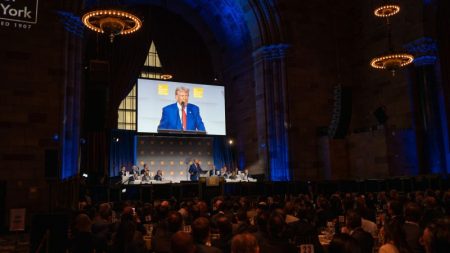France is heading towards a hung parliament and rocky talks to form a government after an unexpected leftwing victory thwarted Marine Le Pen’s efforts to bring the far right to power.
Markets initially reacted negatively to the news but quickly recovered with the euro flat and French stocks making gains.
The leftist Nouveau Front Populaire bloc won the most seats in the high-stakes snap election, dealing a severe blow to Le Pen’s Rassemblement National party, which had seen a parliamentary majority within reach.
The outcome represents a resounding success for the co-ordinated anti-RN strategy, under which the leftwing and centrist parties tactically withdrew their candidates from run-off ballots.
But the result will leave the Eurozone’s second-largest economy in limbo over its next government, with no single bloc near an outright majority in the 577-seat National Assembly.
The gap between benchmark French and German 10-year borrowing costs, seen as a barometer for the risk of holding France’s debt, initially rose from 0.68 to 0.71 percentage points but was later down slightly on the day. The yield on French 10-year bonds was up 0.01 percentage points.
The euro, which has been volatile since President Emmanuel Macron called the elections, erased early losses to trade flat against the dollar at $1.0816.

France’s Cac 40 index of blue-chip stocks fell in early trading, before reversing direction to stand 0.5 per cent up on the day. Europe’s wider Stoxx 600 index also pared losses and was up 0.4 per cent.
“We read the election outcome as overall positive, but with a period of uncertainty in the short term,” said Mohit Kumar, chief European economist at Jefferies. “The period of uncertainty could last for a few days to a few weeks, with potential alliances and attempts to form the government.”
Christian Kopf, head of fixed income at Union Investment, said: “Any sober assessment of this surprise weakening of far-right populism has to conclude that Europe has been strengthened by Sunday’s vote.”
With all constituency results in, the NFP had secured 182 seats, followed by Macron’s centrist Ensemble alliance on 168, according to the Financial Times’ parliamentary election tracker. Ensemble had roughly 250 seats in the outgoing National Assembly.
Meanwhile, Le Pen’s party was pushed into third place by the tactic known as the front républicain, obtaining 143 seats. However, this was a significant increase on the 88 MPs it had in the previous assembly.

Gasps of horror were heard and tears flowed at the main RN election gathering as the first result estimates by pollsters came in on Sunday.
Le Pen, though, said that her party’s victory had only been “delayed” and that the far-right “tide is rising”.
Jean-Luc Mélenchon, the anti-capitalist firebrand and leader of the far-left La France Insoumise (LFI) within NFP, struck a combative tone, calling on Macron to appoint a leftwing prime minister.
“The president has the power, the duty, to call on the Nouveau Front Populaire to govern,” he said, pledging to apply the high-tax, high-spending NFP programme that has spooked investors.
“The will of the people must be strictly respected . . . The defeat of the president and his coalition is confirmed,” Mélenchon said.
Hastily formed after Macron called the election last month, the NFP also includes the centrist Parti Socialiste (PS), the Communists and Greens.
The projected results were met with elation at a PS election event in Belleville, Paris, with chants of “front populaire” and a round of “La Marseillaise”.
“It’s brilliant! Of course it’s brilliant,” Nicolas Mayer-Rossignol, the PS mayor of Rouen and a leading figure in the party, told the FT.
The NFP’s economic programme would be a big break with Macron’s business-friendly agenda and tax-cutting zeal.

France looks headed to a period of political uncertainty that will have repercussions both for the country and the EU, given Paris’s outsized role in influencing the bloc’s policy, together with Germany.
In the French system, the president chooses the prime minister, who typically comes from the party with the biggest delegation in the National Assembly even if it does not have an outright majority.
Prime Minister Gabriel Attal, who took office in January and led the Ensemble campaign, said he would step down on Monday but continue as caretaker as long as needed.
Despite Mélenchon positioning himself to become prime minister, other factions in the NFP have strongly opposed the idea and are gunning for the post as well.
Macron and his allies have ruled out forming a government with either LFI or RN.
Ensemble officials will instead reach out to moderates within the NFP, such as the Socialists and Greens, and to the conservative Les Républicains, to gauge interest in working together, an Élysée official said.
However, forging this kind of deal might prove difficult given the parties’ differences.
A last resort would be to name a technocratic government led by an experienced but non-partisan figure, although this is not at all in the French political tradition.
While the results are far better than expected for Macron, his authority will still emerge weakened from the election.
Macron in June took a gamble in calling for the snap vote after his centrist Ensemble alliance was trounced by the RN in European parliamentary elections.
The president defended the move, which stunned and angered many even in his own camp, as a necessary moment of “clarification”.
Bernard Sananès, head of the pollster Elabe, said the results represented a “victory” of the centrist and leftist parties forming a “front republicain”, saying turnout increased in important races against the far right.
Read the full article here



